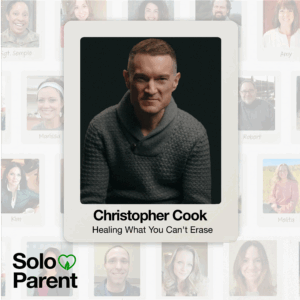When You’re Drowning in the Everyday
You ever have one of those days where you feel like you’re just not okay, but there’s no time to figure out why?
The laundry’s overflowing, your inbox is a wreck, the house is loud or too quiet, and you can’t seem to focus long enough to finish a single thought. You’re exhausted but can’t sleep. You’re overwhelmed but have no time to slow down. The pain point isn’t just burnout, it’s that there’s nowhere to put it. No break room to escape to. No partner to tag in. It’s all on you.
That’s where this conversation begins. Not with a big fix or a dramatic life change, but with the question: What can I do to feel better right now?
If you’re a solo parent living with emotional whiplash, numb one moment, flooded the next, this episode gives permission to get practical. No overhauls. Just a chance to take a breath and shift your day, maybe even your week.
Key Insights from This Episode
This episode speaks directly into the moments that make solo parenting so isolating:
- The emotional exhaustion of living in constant motion with no time to process
- The mental fog that makes even small tasks feel monumental
- The loneliness that creeps in when connection feels like a luxury you can’t afford
These aren’t just inconveniences. They’re the hidden griefs that come with doing life alone. They’re real, and they deserve attention…not just endurance.
1. Decluttering your space can quiet the chaos inside
There’s a reason clearing a counter can feel like an exhale.
Amber shared research showing the connection between clutter and stress: “A University of Connecticut study found that by removing or controlling clutter, we can directly reduce our stress levels.” But it’s more than science—it’s felt. Elizabeth described it best when she said, “I feel an exhale on the inside.”
Even if your whole house is a disaster, one small action—like organizing a drawer or unloading the dishwasher—can bring relief. That little win activates dopamine, which can help reset your brain when everything feels like too much.
Robert noted that when motivation is low, starting small is often the only way forward: “I just pick one area to clean, and suddenly I feel more in control. It changes my momentum.”
2. Tending to your body helps you tend to your mind
Mental fog isn’t always emotional—it’s often physical. Elizabeth described the cognitive shift she experienced after hydrating for a medical procedure. “My brain was firing on all cylinders,” she said. Now, when she feels foggy, she drinks electrolytes. It’s simple—but powerful.
Movement matters too. Whether it’s walking, stretching, or dancing in the kitchen, rhythmic movement can pull you out of an anxious spiral. Robert admitted he’d never really considered gentle movement as a coping tool until prepping for this episode: “I don’t gravitate toward yoga—though I know I look like I do—but it really does help.”
Amber shared that even four 45-minute walks a week have been shown to match the impact of some antidepressants. Your body is talking. You might just need to listen.
3. Connection, emotional or physical, restores your sense of safety
Sometimes the best medicine is presence. Whether it’s journaling, a long cry, prayer, or creating something with your hands, tuning into your emotions instead of pushing through them can be a turning point.
Elizabeth shared a vulnerable story about sobbing for hours and then praying, “God, I’m so mad at You, but please be with me.” She admitted she didn’t want to feel the pain anymore, but inviting God into it—honestly—changed everything.
Creativity can also be a safe place to land. Amber described the peace she’s found in watercolor painting: “I can’t scroll my phone or stress while I paint. It forces me to be fully present.”
And physical connection? That matters too. Whether it’s a 20-second hug with your child or a thumbs-up across a football field, that moment of resonance grounds both of you. “Even eye contact helps our nervous systems regulate,” Amber said.
When loneliness hits, social interaction—however small—can pull you back to life. Elizabeth told a beautiful story about asking her siblings to host a game night. “My brother-in-law wouldn’t let me lift a finger. It pulled me out of my head, out of my element. Sunday was a much better day.”
Listener Question of the Week
“When and how should I start talking to my child about online safety?”
Robert’s answer was clear: “Now. Maybe even before they’re online.”
Amber agreed: “It’s not just a one-time conversation. It’s an ongoing dialogue at different levels.” She even mentioned that she still brings things up to her adult children when she hears about new threats online.
Elizabeth shared her experience with Jax, her middle school son, who games online: “We’ve put blockers in place so he can only chat with people he knows, but I’ve also taught him what to do when something feels off. Just last week he shut down a conversation with someone asking inappropriate questions—and he handled it on his own.”
She added that even though she doesn’t hover, she still checks in on his YouTube history and texts now and then—just to help keep him honest and aware.
Robert closed with a sobering reminder: “Online access isn’t neutral. It shapes their worldview. And there’s potentially nothing more dangerous than what they’re exposed to online. This conversation never stops.”
Resources from This Episode
We want to answer any Solo Parent questions you may have. Submit your listener questions HERE.
Additional Resources:



